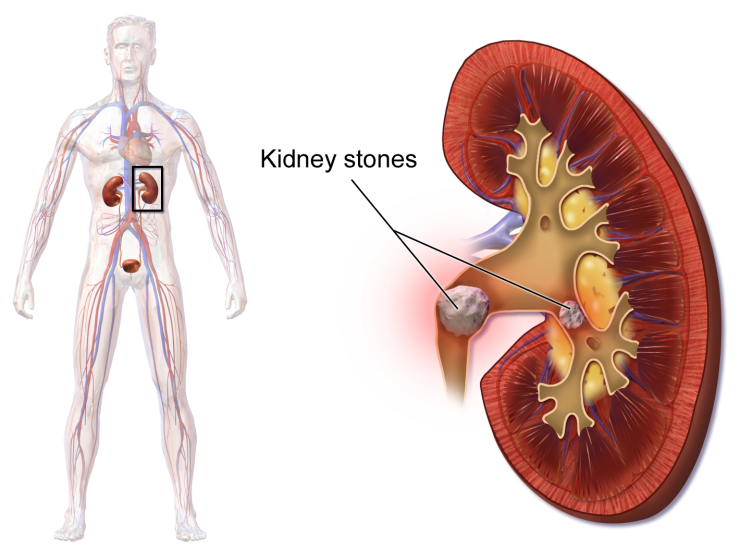
Kidney crystals are solid clusters of
A. Calcium nitrate and uric acid
B. Calcium phosphate and uric acid
C. Calcium carbonate and uric acid
D. Calcium metabisulfite and uric acid
Answer
571.5k+ views
Hint: A thin, difficult deposit that forms in the kidneys when passed, which is sometimes painful. In concentrated urine, kidney stones are strong deposits of minerals and acid salts that stick together. When going through the urinary tract, they can be painful, but typically don't cause permanent damage.
Complete answer:

A solid cluster made up of tiny crystals is a kidney stone.Groups of kidney stones are as follows:A particular metabolic or hormonal condition, such as hyperparathyroidism of renal tubular acidosis, is associated with calcium phosphate stones.A byproduct of protein metabolism is uric acid stones. Uric acid stones are associated with consuming a diet that is rich in protein. Gout, genetic factors and disorders associated with the treatment of chemotherapy can cause them to occur.Struvite stones are connected to an infection of the urinary tract caused by a particular bacterial type.In people who have cystinuria, a genetic condition that causes the kidneys to excrete large quantities of certain amino acids, cystine stones may develop.Calcium oxalate stones are about 85 percent of kidney stones are made of calcium, typically forming from excess calcium in the urine.
So, the correct answer is “Option B”.
Note: Kidney crystals are hard deposits that form within your kidneys, made from minerals and salt. Passing kidney stones may be very painful, but if recognized in a timely manner, the stones usually do no lasting harm. You can need nothing more than to take painkillers and drink plenty of water to push through a kidney stone, depending on your condition. For example, in other cases, if stones are embedded in the urinary tract, they are associated with urinary infection or cause complications. Surgery may be required.
Complete answer:

A solid cluster made up of tiny crystals is a kidney stone.Groups of kidney stones are as follows:A particular metabolic or hormonal condition, such as hyperparathyroidism of renal tubular acidosis, is associated with calcium phosphate stones.A byproduct of protein metabolism is uric acid stones. Uric acid stones are associated with consuming a diet that is rich in protein. Gout, genetic factors and disorders associated with the treatment of chemotherapy can cause them to occur.Struvite stones are connected to an infection of the urinary tract caused by a particular bacterial type.In people who have cystinuria, a genetic condition that causes the kidneys to excrete large quantities of certain amino acids, cystine stones may develop.Calcium oxalate stones are about 85 percent of kidney stones are made of calcium, typically forming from excess calcium in the urine.
So, the correct answer is “Option B”.
Note: Kidney crystals are hard deposits that form within your kidneys, made from minerals and salt. Passing kidney stones may be very painful, but if recognized in a timely manner, the stones usually do no lasting harm. You can need nothing more than to take painkillers and drink plenty of water to push through a kidney stone, depending on your condition. For example, in other cases, if stones are embedded in the urinary tract, they are associated with urinary infection or cause complications. Surgery may be required.
Recently Updated Pages
Master Class 11 Computer Science: Engaging Questions & Answers for Success

Master Class 11 Business Studies: Engaging Questions & Answers for Success

Master Class 11 Economics: Engaging Questions & Answers for Success

Master Class 11 English: Engaging Questions & Answers for Success

Master Class 11 Maths: Engaging Questions & Answers for Success

Master Class 11 Biology: Engaging Questions & Answers for Success

Trending doubts
One Metric ton is equal to kg A 10000 B 1000 C 100 class 11 physics CBSE

There are 720 permutations of the digits 1 2 3 4 5 class 11 maths CBSE

Discuss the various forms of bacteria class 11 biology CBSE

Draw a diagram of a plant cell and label at least eight class 11 biology CBSE

State the laws of reflection of light

Explain zero factorial class 11 maths CBSE




